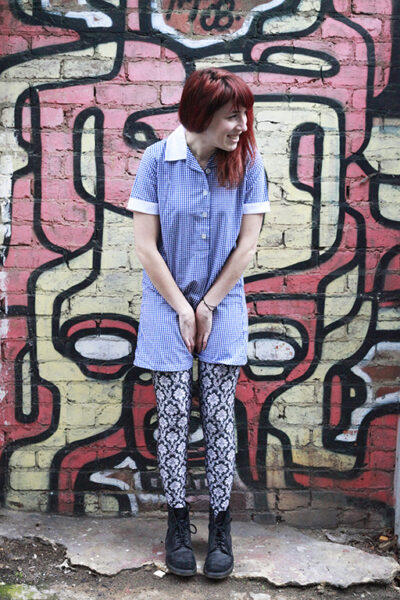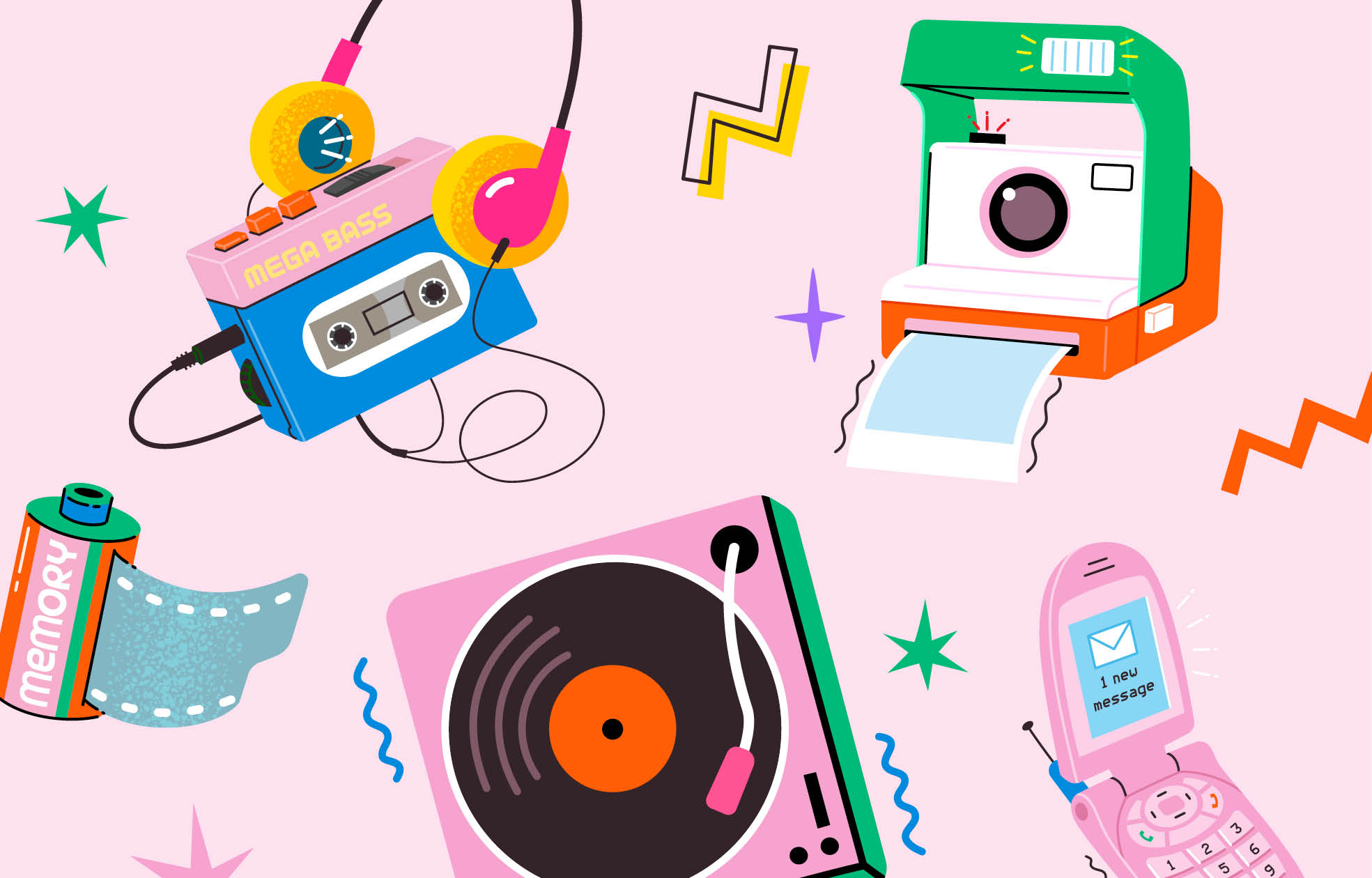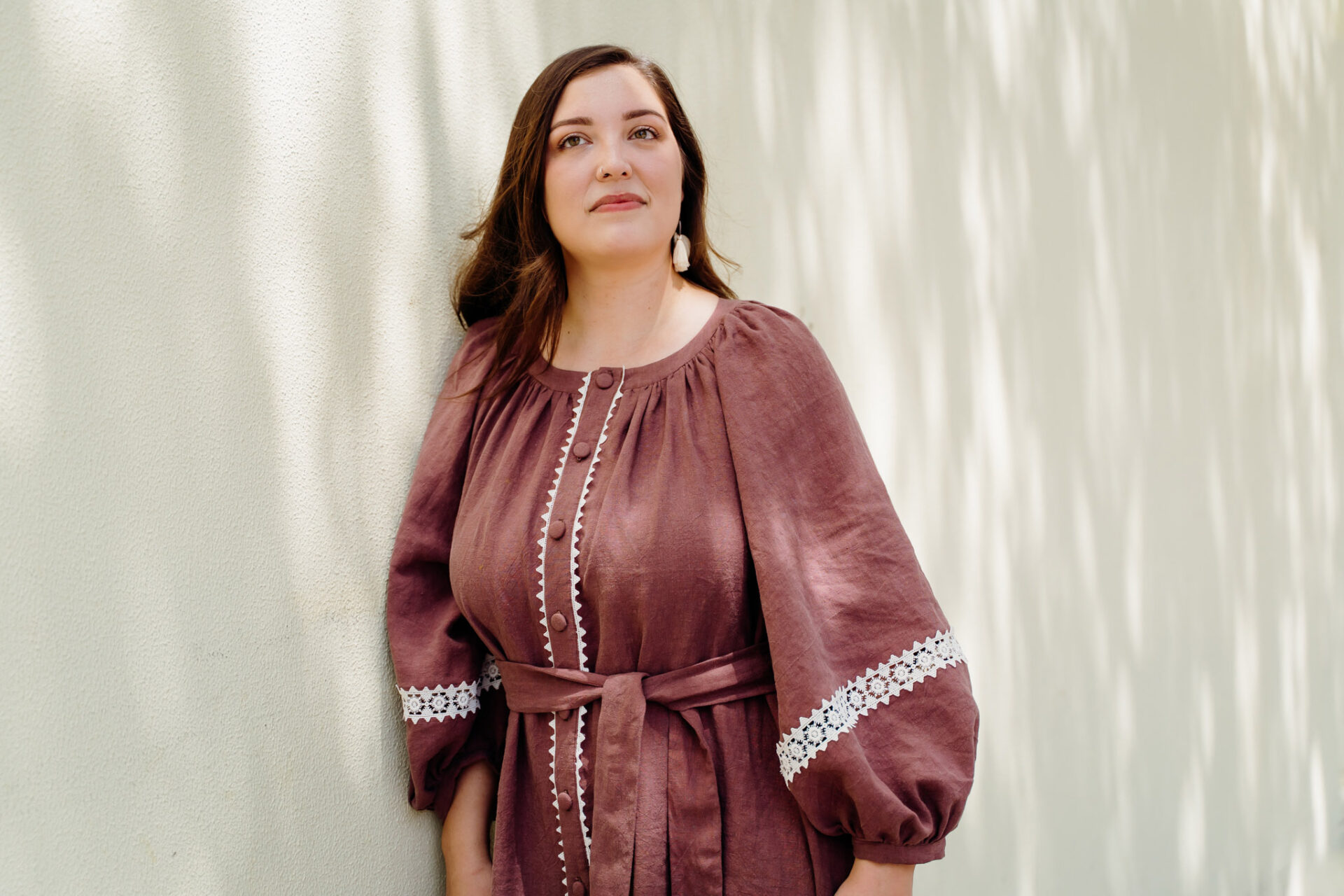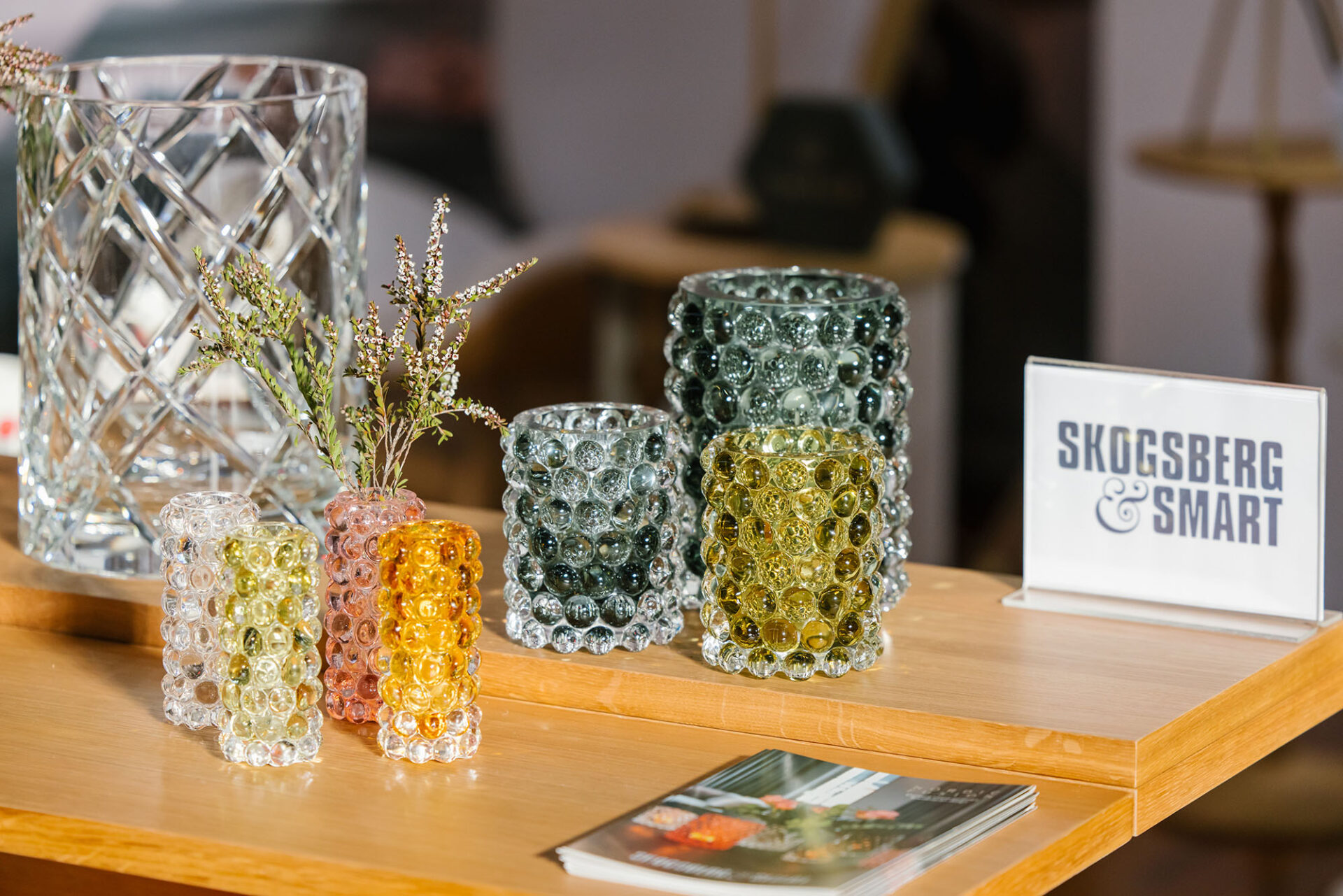Dress for Success
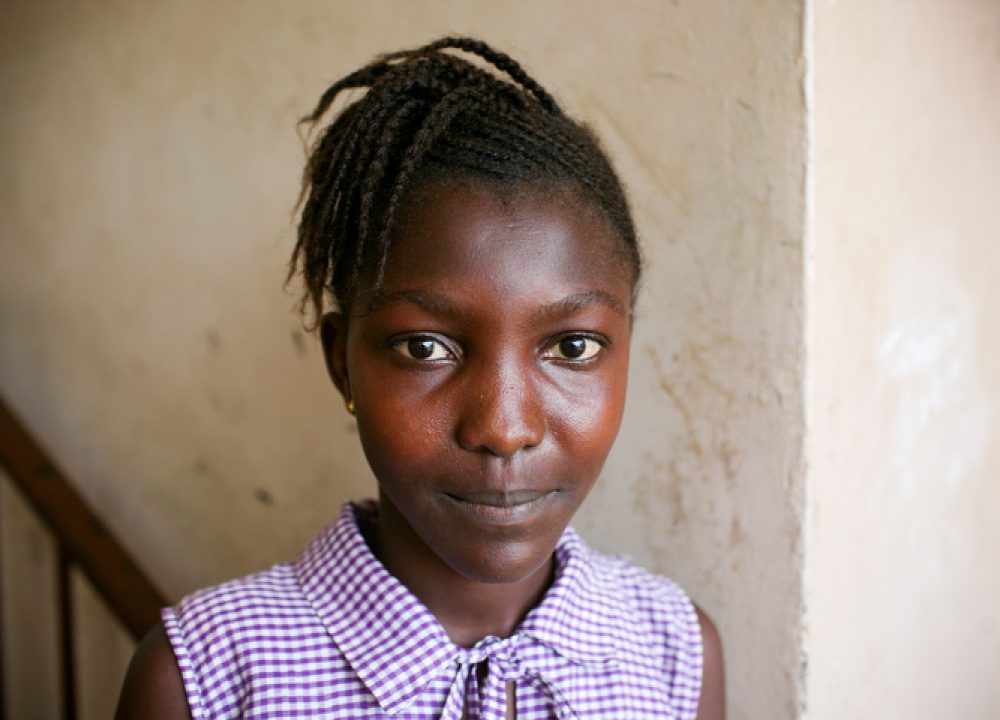
- Words by Peppermint
Every October, not-for-profit organisation One Girl invite men and women, boys and girls to frock up in a school dress in the name of their major annual fundraiser, Do It In A Dress. “The concept is easy – you pick any challenge you like, raise a minimum of $300, and do it in a school dress,” says one of 2013’s participant, Roz Campbell. Money raised helps One Girl’s campaign to get more girls in Sierra Leone a formal education. But aside from financial hurdles, limited options are available for managing menstruation in the country: another big reason so many girls miss out on schooling in Sierra Leone. So, planning to launch her own sanitary pad business later this year, Roz decided to make her Do It In A Dress project all about menstruation. Planning to test some of the methods girls in Sierra Leone use to manage their periods, Roz has set herself a challenge to say the least. We spoke to her about her research and what she hopes to achieve.
How do most girls in Sierra Leone manage their periods?
The more research I do, the more shocking it becomes! Initially Chantelle Baxter [One Girl Co-Founder] told me stories of girls using ‘pieces’ – which are old rags. They don’t get washed properly and are left to dry in the dark damp areas of the house so no one will see them, which is a breeding ground for infections. The other methods I have heard about are layered underwear, kitchen sponges, toilet paper, newspaper, leaves and bark, chicken feathers, piling up dirt to sleep on and sweeping it away in the morning. I recently read that some younger girls even find used sanitary pads in the rubbish and use those.
I should also note that tampons and menstrual cups are not physically or culturally appropriate in Sierra Leone, as the majority of girls have been circumcised, only leaving a small opening for urine and blood to pass through.
What period management approaches will you be trying for your Do It In A Dress campaign?
For each day of my period I plan to road test a different method, and report back on the experience. At this stage, I will be making some pieces, using a kitchen sponge, layering underwear, paper, and leaves and bark – and maybe feathers if there’s time. I might try sleeping on some sand at nighttime and see what happens there.
Which method are you least looking forward to trying?
To be honest, I’m not looking forward to the whole experience. It’s going to be awkward and uncomfortable at a time when I’m usually more sensitive and emotional. I already know I’m going to be paranoid about getting blood on my dress, but I have to try and live life normally. Going to work and socialising is going to be hard. I haven’t even done it yet, but already it’s highlighting the issues girls in Sierra Leone face every month.
Why do you think education for girls is important?
I’ve memorised the One Girl moto which sums it up perfectly. “An educated girl is three times less likely to contract HIV/ AIDS. She’ll marry later and have fewer, healthier children. For every extra year of schooling her income will increase by 10-25 percent. Not only that, she’ll reinvest 90 percent of the money she earns back into her family. Educating a girl has a ‘multiplier effect’. An educated girl can change the world.” That’s why I believe education for girls is important.
How can other people get involved?
Sign up to Do It In A Dress! Tell your friends and family! Or, if you don’t want to do your own challenge, you can support me here. I’ve already raised enough funds to send two girls to school, but would love to see that grow.
JOIN OUR MAILING LIST
Brighten up your inbox with our not-too-frequent emails featuring Peppermint-related news, events, competitions and more!
explore
More articles
Look, I don’t want to make anyone panic but IT’S DECEMBER!!! If you’re planning to give homemade gifts, you’re going to have to act fast. …
Hang out with us on Instagram
As issue 64’s gorgeous cover artwork by artist @LisaCongdon proudly proclaims: you belong here. Yet for trans and non-binary people, acceptance still remains hard won – and increasingly under threat.
In our latest issue, we spoke to actress and transgender rights advocate @GeorgieStone, multi-hyphenate life coach, pilates and meditation teacher, diversity educator and runway model @RudiLandmann, artist and seven-time Archibald finalist Kim Leutwyler (@CarlosBob) and multidisciplinary artist Sunday Jemmott of @SundaysArtClub about their wins and worries – and why belonging matters deeply.
Read more from our ‘Transforming the Narrative’ feature in issue 64, at newsagents and stockists now!
Photos: @NickCog, @KateLukePhotography for @DangerousFemales, Kim Leutwyler, @RissVisualStudio
#PeppermintMagazine #YouBelong #TransLivesMatter #NonBinary #HumanRights

Who’s going to the sold out Liberty Fabrics Showcase in Brisbane or Melbourne? 🙋♀️
To say we’re excited is an understatement! Maybe we’re biased because our lovely Laura (Sewing Manager) is walking in the fashion parade along with many other incredible sewists in our community, but also - there’s SO many good things: retail stalls featuring exclusive products, rare finds and all things @LibertyFabrics, and sneak peeks at brand-new quilting and fashion collections, including the Liberty Fabrics Spring/Summer ‘Floral Rebellion’ collection.
Also - Liberty legends Mary-Ann Dunkley (Head of Design) and Anna Buruma (ex-Head of Archive) are flying in from London especially!
Keep an eye on our socials this weekend for BTS! 🌸🌼🌺
Brisbane 7/2/26
Melb 14/2/26
From @Laura_The_Maker:
If you know me irl then you probably know that I only do one take for my reels so enjoy this vid of me saying thousands of words about an exciting collaboration I’m participating in for 2026!
Thanks to the teams @2GreenZebras @Regent_Street_Fabrics and @StyleArc for including me on the runway. I absolutely can’t wait!
Obviously I’ll be hoping for enough scrap fabric to make some kind of accessories…
#libertyfabrics #libertyfabricsshowcase

🌻 The Paddington 🌻
This is a much-loved staple, created for Issue 50 in 2021. We love seeing the #PeppermintPaddingtonTop continually popping up in our feeds!
How stunning is our model Elon MelaninGoddessEfon – she told us it was one of the first times she had been asked to come to a shoot with her natural hair. 🌻
We worked with South African patternmaker Sarah Steenkamp of @FrenchNavyNow_ to create this wardrobe essential – the perfect puff-sleeve blouse. Raglan sleeves make it the ultimate beginner sew, plus the gorgeous back buttons let you add your own personal twist.
Pattern via the link in bio! 🪡
Photos: @KelleySheenan
Fabric: @Spoonflower
Model: MelaninGoddessEfon

“In the 1940’s, Norwegians made and wore red pointed hats with a tassel as a form of visual protest against Nazi occupation of their country. Within two years, the Nazis made these protest hats illegal and punishable by law to wear, make, or distribute. As purveyors of traditional craft, we felt it appropriate to revisit this design.”
Crafters have often been at the heart of many protest movements, often serving as a powerful means of political expression. @NeedleAndSkein, a yarn store in Minnesota, are helping to mobilise the craftivists of the world with a ‘Melt The Ice’ knitting pattern created by @Yarn_Cult (with a crochet pattern too), as a way of peaceful protest.
The proceeds from the $5 pattern will go to local immigrant aid organisations – or you can donate without buying the pattern.
Raise those needles, folks – art and craft can change the world. 🧶
Link in bio for the pattern.
Images: @Gather_Fiber @NeedleAndSkein @a2ina2 @KyraGiggles Sandi.204 @WhatTracyMakes AllieKnitsAway Auntabwi2
#MeltTheIce #Craftivism #Knitting #CraftForChange

TWO WEEKS TO GO! 🤩
"The most important shift is moving from volume-led buying to value-led curation – choosing fewer, better products with strong ethics, considered production and meaningful stories. Retailers have real influence here: what you buy signals what you stand for. At Life Instyle, this means using the event to discover and invest in small-scale, planet-considerate brands that align with your values and your customer’s conscience. Consumers don’t need more things; they need better things, and retailers play a key role in selecting, contextualising, and championing why those products matter."
Only two more weeks until @Life_Instyle – Australia`s leading boutique retail trade show. If you own a store, don`t miss this event! Connect with designers, source exquisite – and mindful – products, and see firsthand why this is Australia’s go-to trade show for creatives and retailers alike. And it`s free! ✨️
Life Instyle – Sydney/Eora Country
14-17 February 2026
ICC, Darling Harbour
Photos: @Samsette
#LifeInstyle #SustainableShopping #SustainableShop #RetailTradeEvent

Calling all sewists! 📞
Have you made the Peppermint Waratah Wrap Dress yet? Call *1800 I NEED THIS NOW to get making!
This gorgeous green number was modelled (and made) by the fabulous Lisa of @Tricky.Pockets 🙌🏼
If you need a nudge, @ePrintOnline are offering Peppermint sewists a huge 🌟 30% off ALL A0 printing 🌟 when you purchase the Special Release Waratah Wrap Dress pattern – how generous is that?!
Head to the link in bio now 📞
*Not a real number in case that wasn`t clear 😂
#PeppermintWaratahWrapDress #PeppermintPatterns #SewingPattern #WrapDress #WrapDressPattern


